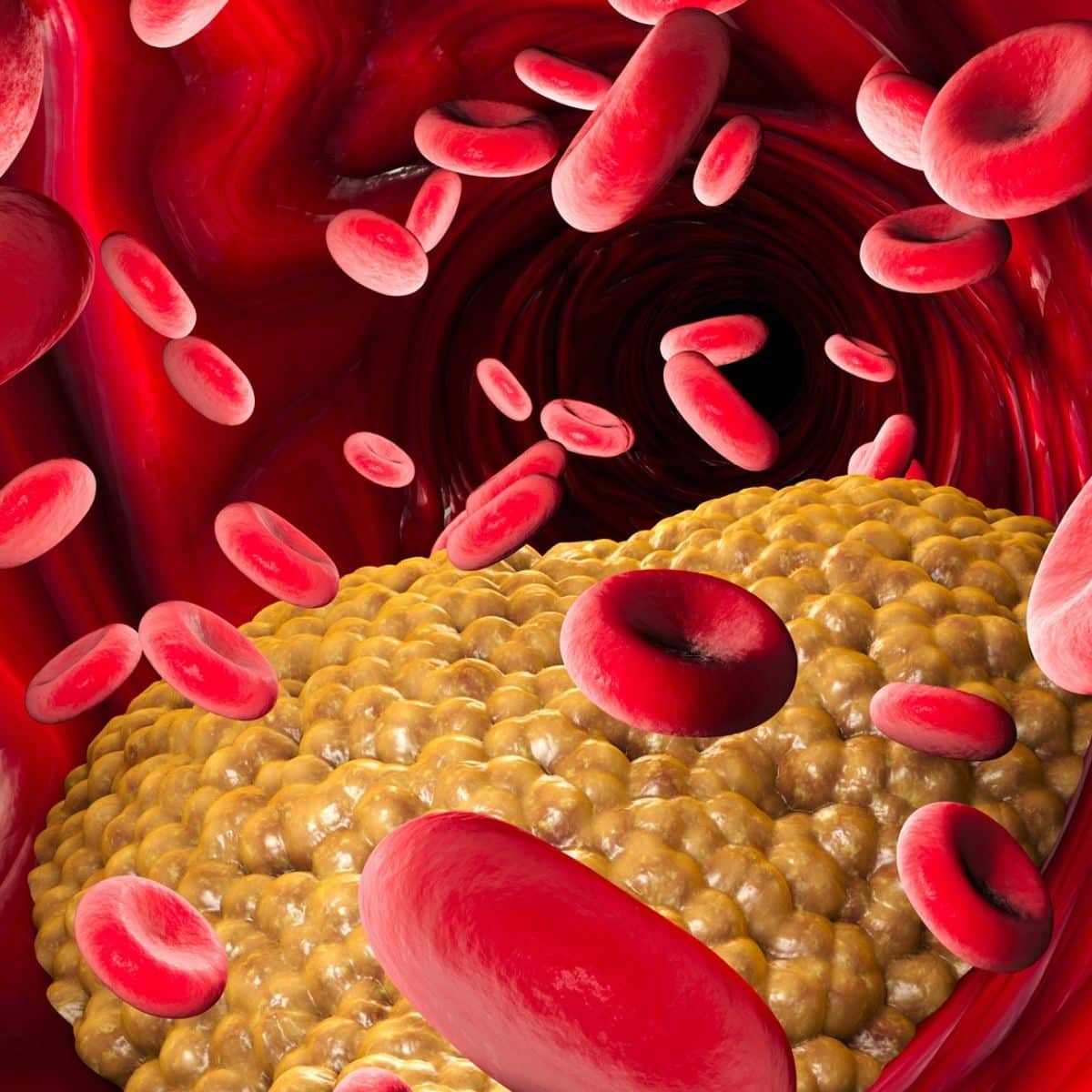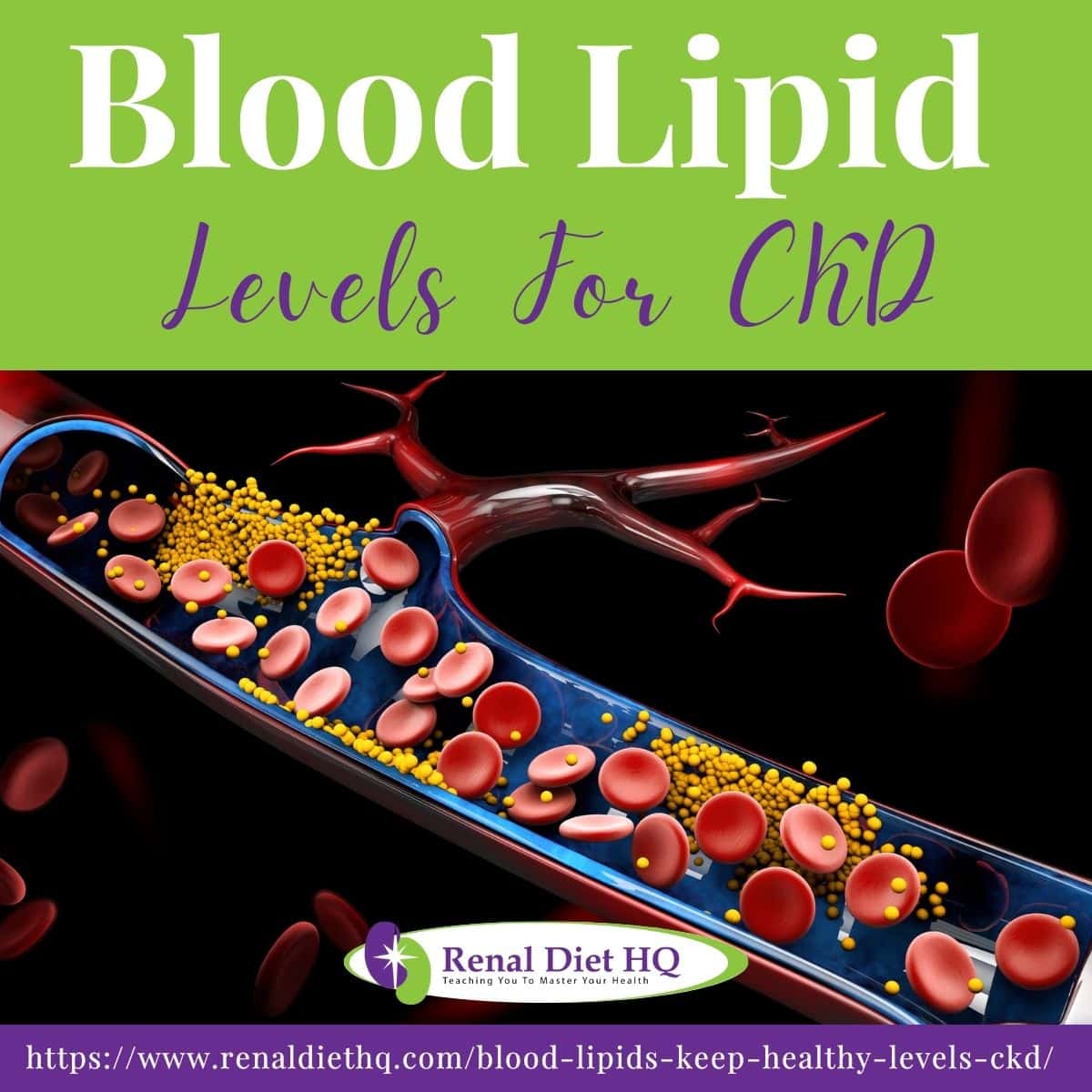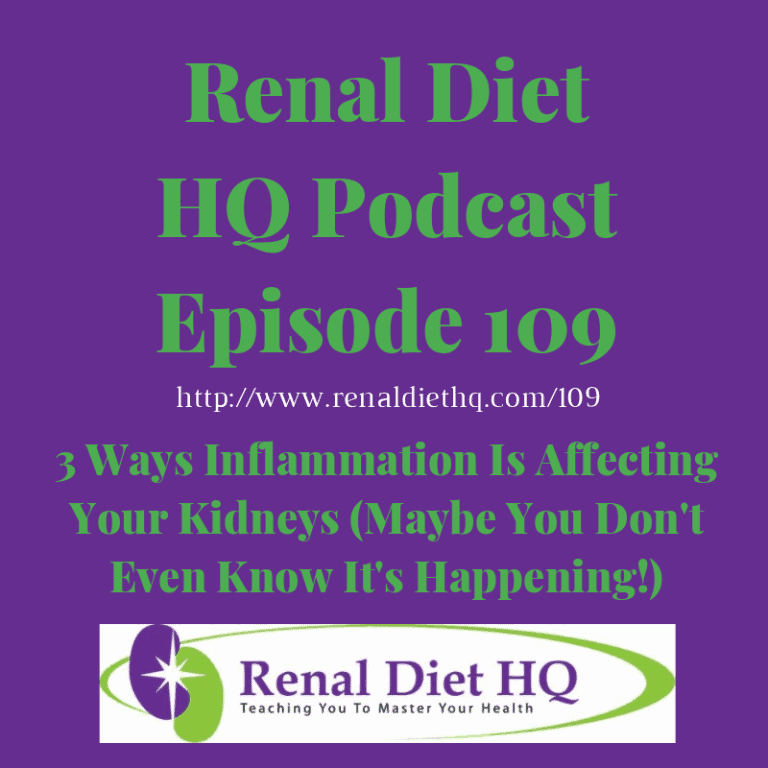Blood Lipid Levels For CKD
Are you living with chronic kidney disease (CKD)? If so, understanding your blood lipid levels is critical for managing your condition and reducing the risk of serious health complications.
High cholesterol can increase the risk of CKD and heart disease, so it's important to take steps to keep your cholesterol under control.
In this article, we'll discuss the different types of blood lipids, target levels for people with CKD, medications that can help lower cholesterol levels. Associated risks of heart disease, coronary risk, and dietary changes that can help improve cholesterol levels, and physical activity recommendations. Don't forget about exercise for healthy heart as well!

One of the most serious health concerns chronic kidney disease patients need to know about is heart disease. Cardiac death is actually the most common cause of death in those with kidney disease.
Understanding heart disease and learning to live a healthy life are essential in order to lower your risk of developing this condition.
A great way to help control your risk of coronary events is by controlling your blood lipid levels. Heart problems can begin when you have unhealthy levels of these lipids in your body and increase the risk of disease progression.
You do need some lipids in order for your organs to function properly. Too much can be a very dangerous thing, however – especially when you are already suffering from CKD. It's important to understand how ckd progression works.
Jump to:
Overview
People with chronic kidney disease are at an increased risk of cardiovascular events like heart attack (myocardial infarction), coronary heart disease, or stroke, and controlling their blood lipid levels can help reduce this risk.
Lipids are fatty substances found in the blood that include LDL (bad cholesterol), HDL (good cholesterol), and triglycerides (fat in the blood).
High levels of LDL can create plaque buildup in the arteries, while high levels of HDL (High-Density Lipoprotein Cholesterol) can help prevent plaque buildup. Triglycerides are used for energy, but excess levels can lead to health problems.
It's important to keep these lipids within a healthy range to decrease chances of coronary death, heart attacks or strokes. Getting a lipid profile done by a doctor could help monitor any changes to these lipids over time so they do not become too dangerous or cause serious medical issues later down the road such as coronary artery disease or stroke due to hardening of the arteries from high cholesterol buildup.
Following a low-cholesterol and low-saturated fat diet is recommended to lower blood lipid levels, as well as possible drug therapy. Regular exercise also helps control both blood lipid levels as well as blood pressure, keep in mind that there are exercise mistakes to avoid with CKD.
It's essential for those living with chronic kidney disease to take preventive measures now rather than wait until complications arise later on from unchecked lipids that have been left untreated for too long.
For More Recipes and Ideas --->> Get Your Free Meals and Recipes That Are Perfect for Pre-Dialysis Diets, Pre-Dialysis with Diabetes, or Dialysis Diets.
Risk Factors
You could be at risk of serious health consequences if your cholesterol, HDL, LDL, and triglyceride levels are not in check. People with chronic kidney disease are particularly vulnerable to the dangers of high blood lipid levels, especially non-HDL cholesterol levels.
Risk factors for developing high blood lipids include: unhealthy diet choices such as eating too much saturated fat or trans-fatty acids, lack of physical activity, smoking, excessive alcohol consumption, and being overweight or obese.
It's important to take steps to reduce these risk factors by making lifestyle changes such as increasing physical activity, maintaining a healthy weight, improving food choices, quitting smoking, and limiting alcohol intake.
Eating foods that are low in saturated fat and trans-fatty acids while increasing soluble fiber can also help lower cholesterol levels and serum triglyceride levels. You can even check out this low fat low cholesterol diet meal plan.
Additionally, medications may be prescribed to help control LDL cholesterol and triglycerides for lipid management. Regular monitoring of blood lipid levels is essential for people with CKD to ensure they remain within safe ranges and reduce their risk of coronary disease and other serious medical issues.
GFR and CKD Diagnosis
Your e(GFR) blood test is the best indicator of your renal function, and those with abnormal cholesterol levels are twice as likely to develop chronic kidney disease.
GFR is a measure of renal function that plays a vital role in the diagnosis and management of chronic kidney disease.
GFR refers to the rate at which the kidneys filter waste products and excess fluid from the bloodstream. It is considered one of the most accurate indicators of renal function.
In the diagnosis of CKD, glomerular filtration rate is used to determine the stage of the disease. CKD is typically diagnosed when there is renal dysfunction characterized by GFR below the range of normal kidney function (typically less than 60 mL/min/1.73m²) for a period of at least three months.
GFR provides valuable information about the extent of kidney damage, trend of decline in kidney function, and helps guide appropriate treatment and management strategies.
The stages of CKD are categorized based on the severity of GFR decline, ranging from stage 1 (mild) to severe renal dysfunction at stage 5 (end-stage renal disease).
Renal failure patients with end-stage renal disease undergo progression of kidney disease such that they require renal replacement therapy in the form of chronic dialysis (hemodialysis or peritoneal dialysis) or kidney transplant to make up for the lost renal function and improve renal outcomes.
At this advanced stage there may be accumulation of uremic toxins and systemic inflammation. Overall, risk of death due to atherosclerotic events may be higher for renal failure patients, so optimal management of dyslipidemia is crucial.
To determine the glomerular filtration rate, healthcare providers may use various methods, including blood tests and equations that take into account factors such as age, sex, race, and serum creatinine levels. Additionally, other markers such as cystatin C and urinary albumin levels may be used in specific situations.
Controlling blood lipid levels is crucial for individuals with CKD. Chronic kidney disease is associated with an increased risk of cardiovascular disease (CVD), which is the leading cause of morbidity and mortality in people with kidney disease.
Dyslipidemia, characterized by high levels of total cholesterol, low-density lipoprotein (LDL) cholesterol, and triglycerides, and low levels of high-density lipoprotein (HDL) cholesterol, is commonly observed in CKD.
Elevated blood lipid levels in CKD patients contribute to the development and progression of CVD. This is attributed to the detrimental effects of dyslipidemia on blood vessels, promoting atherosclerosis and increasing the risk of heart attacks and strokes. Additionally, CKD itself can disrupt lipid metabolism, leading to abnormal lipid profiles.
Controlling blood lipid levels in people with kidney disease is crucial to reduce the risk of adverse cardiovascular outcomes and improve overall health.
By maintaining optimal blood lipid levels, individuals with CKD can reduce the risk of cardiovascular death and improve their overall health. It is essential for CKD patients to work closely with their healthcare team, including nephrologists and dietitians, to develop personalized strategies to manage dyslipidemia and protect their cardiovascular health.

Blood Lipids: LDL, HDL, Triglycerides
Controlling your cholesterol, triglycerides, and other fatty substances in the body can help reduce the risk of heart disease and coronary events, a common cause of death among those with chronic renal disease.
Lipids are one type of fatty substance that plays an important role in your health. There are three types of lipids: LDL (bad cholesterol), HDL (good cholesterol), and triglycerides (fat in the blood).
There are three main types of blood lipids:
- Low-Density Lipoprotein Cholesterol (LDL) – Known as the “bad cholesterol” These lipids can create atherosclerotic plaque buildup in the arteries. Keeping your LDL level under control helps prevent heart disease.
- High-Density Lipoprotein Cholesterol (HDL) – The “good” cholesterol that helps keep the LDL cholesterol from building up plaque in your arteries. Having more of this HDL cholesterol is healthy for your heart.
- Triglycerides – This is the fat in the blood that is used for energy. Only a small amount is needed for energy, however, and the rest is stored for later. This is the fat you may have around your abdomen or hips. It’s important that you keep your triglycerides levels in check and work toward helping your body burn off the excess so it doesn’t get too high.
When your blood lipid levels are too high, atherosclerotic plaque can build up in your arteries and endothelial dysfunction may develop. This makes it difficult for your blood to move throughout your body. As a result, your heart has to pump harder, causing your blood pressure to go up.
High blood pressure is a very grave concern for those with chronic kidney disease. If you have both hypertension and CKD, you are at a greater risk for heart disease and coronary syndromes. So, along with controlling your blood pressure, you also want to control your blood lipid levels.
Target Levels
Maintaining healthy blood lipid levels is crucial for reducing the risk of heart disease, a leading cause of morbidity and mortality worldwide. Target levels of blood lipids serve as benchmarks for assessing cardiovascular risk factors and guiding interventions to promote optimal lipid profiles.
Curious about managing renal diet limits? When managing your diet and lifestyle, it is important to keep target levels in mind:
- A total cholesterol level below 200 milligrams per deciliter (mg/dL) is generally recommended. Total cholesterol is a measure of all types of cholesterol present in the blood, including both "good" high-density lipoprotein (HDL) cholesterol and "bad" low-density lipoprotein (LDL) cholesterol.
- Aim for an HDL level of 40 mg/dL or higher. HDL cholesterol is considered beneficial as it helps remove LDL cholesterol from the bloodstream, reducing the risk of plaque formation in the arteries.
- Keeping LDL cholesterol below 100 mg/dL is another target to strive for. Elevated LDL cholesterol is associated with the buildup of plaque in the arteries, leading to atherosclerosis and increasing the risk of cardiovascular disease. If you have heart disease or have had a myocardial infarction (heart attack) your cardiologist may want your LDL levels lower than 100 mg/dl.
- Additionally, it is important to aim for a triglyceride level no greater than 150 mg/dL. Triglycerides are a type of fat found in the blood, and elevated levels are associated with an increased risk of cardiovascular events.
By striving to achieve these target levels, individuals can reduce their risk of cardiovascular diseases and promote cardiovascular health. However, it is important to note that these target levels may vary depending on individual risk factors, medical history, and specific recommendations from healthcare professionals.
Regular monitoring of blood lipid levels and working closely with healthcare providers can help guide appropriate interventions to maintain optimal lipid profiles and support overall cardiovascular well-being.
Lifestyle Changes
Making lifestyle changes can help you keep your cholesterol in check and reduce the risk of developing chronic kidney disease. Increasing physical activity, maintaining a healthy weight, and improving food choices are all important steps to take.
Eating whole-grain products, oats, bran, fatty fishes like salmon and albacore tuna, antioxidant-rich fruits and vegetables, and foods with omega-3 fatty acids like walnuts and avocado is recommended for keeping cholesterol levels low.
Limiting alcohol consumption is also crucial for controlling lipid levels. It is important to avoid animal products high in saturated fat, fried foods, high-fat processed meats, and simple sugars. Regular exercise at least four days per week is beneficial for reducing the risk of heart disease associated with CKD.
Medication Treatment
Taking charge of your health is the key to keeping chronic kidney disease at bay, and medication can be a powerful tool in helping you do just that.
Statins are commonly prescribed for people with CKD to control cholesterol levels, slow the progression of CKD, and reduce the risk of heart disease. Your doctor will also likely recommend controlling high blood pressure and diabetes if present, as they can increase the risk of both cardiac events and CKD progression.
Additionally, other medications may be recommended to lower LDL cholesterol and triglycerides. These include bile acid sequestrants, fibrates, nicotinic acid derivatives, and omega-3 fatty acids.
It's important to discuss all potential side effects with your doctor before embarking on any medication regimen.
It's vital that you monitor your blood lipid levels regularly in order to ensure that treatment is effective. A lipid profile should be done yearly or more often if needed - this includes tests for total cholesterol, LDL (bad) cholesterol, HDL (good) cholesterol, and triglycerides.
When you receive your results from your doctor it's important to understand what they mean so that you can make informed decisions about lifestyle changes or treatments necessary to improve them if needed.
Risks of Heart Disease
People with chronic kidney disease (CKD) are at a higher risk of developing heart disease, as cardiovascular mortality is the most common cause of death in this group. It's important to take steps to lower your blood lipids in order to reduce your risk.
High LDL cholesterol, HDL cholesterol, and triglycerides all contribute to plaque buildup in arteries, which can lead to high blood pressure - a serious concern for those with CKD.
Dyslipidemia, characterized by abnormal levels of lipids in the blood, is commonly observed in individuals with CKD (7 day meal plan for chronic kidney disease).
Elevated LDL cholesterol levels contribute to the formation of atherosclerotic plaques, narrowing the arteries and impairing blood flow to the heart. This can lead to cardiovascular events such as coronary artery disease, heart attacks, and strokes.
In addition, low levels of HDL cholesterol, often seen in CKD patients, can further increase the risk of heart disease. HDL cholesterol is considered "good" cholesterol as it helps remove excess cholesterol from the bloodstream and has protective effects on the cardiovascular system.
Reduced levels of HDL cholesterol can impair this protective mechanism, leaving individuals more susceptible to heart disease.
Furthermore, elevated triglyceride levels are associated with increased cardiovascular risk. Triglycerides are a type of fat found in the blood, and high levels can contribute to the development of atherosclerosis.
Considering the higher risk of heart disease in patients with kidney disease with dyslipidemia, it is essential to actively manage lipid levels.
This may involve medication, lifestyle modifications, and close monitoring by healthcare professionals. By effectively controlling dyslipidemia, individuals with CKD can reduce their risk of heart disease and improve their overall cardiovascular health.

Dietary Changes To Improve Levels of Cholesterol
Taking proactive steps to reduce your cholesterol can help keep your heart healthy, giving you peace of mind and a longer life. To improve cholesterol levels, consider making the following changes to your diet:
- Limit animal products high in saturated fat
- Consume foods rich in omega-3 fatty acids like walnuts, avocado and fatty fishes like salmon
- Eat whole-grain products, oats, bran,
Making dietary changes is one way to reduce levels of LDL (bad cholesterol) while increasing HDL (good cholesterol).
Eating antioxidant-rich fruits and vegetables can also help lower blood lipid levels. This will help prevent plaque buildup in the arteries that leads to high blood pressure and other medical complications associated with chronic kidney disease.
To effectively manage blood lipid levels, it is recommended to avoid animal products high in saturated fat, fried foods, high-fat processed meats, and simple sugars.
Instead, focus on consuming whole-grain products, oatmeal, bran, fatty fishes like salmon and albacore tuna, antioxidant-rich fruits and vegetables, and foods rich in omega-3 fatty acids such as walnuts and avocado.
By choosing the right foods, individuals can make beneficial dietary choices to manage cholesterol levels. Conversely, it is important to limit the intake of animal products high in saturated fat, including beef, lamb, duck, veal, cheese, butter, and egg yolks, while also avoiding fried foods, high-fat processed meats, and simple sugars found in candy, cookies, and soft drinks.
In addition to dietary adjustments, maintaining healthy habits is essential. This includes consuming well-balanced meals featuring whole grains, fatty fish like salmon, fruits and vegetables rich in antioxidants, legumes, nuts (nut flours for kidney disease), seeds, and low-fat dairy products.
By adopting these dietary recommendations and healthy habits, individuals can proactively manage their blood lipid levels and support overall cardiovascular health.
While it may take some time for these changes to have an effect on your body, they're well worth the effort as they can make a significant impact on overall health.
Physical Activity
Regular physical activity plays a crucial role in managing blood lipid levels, particularly for individuals with chronic kidney disease (CKD). Engaging in a moderate exercise program of at least four days per week is recommended to maintain health and promote overall well-being.
Exercise offers various benefits for individuals with CKD, including the ability to reduce LDL cholesterol, increase HDL cholesterol, and lower triglyceride levels.
Aerobic exercises like walking, jogging, biking, or swimming are particularly advantageous for managing blood lipids in CKD patients.
These activities can be complemented by resistance training, such as weight lifting or using resistance bands, to enhance strength and endurance while contributing to blood lipid control.
When incorporating exercise into a routine, it is important to start slowly and gradually increase the intensity over time. Listening to your body and recognizing signs of fatigue or pain is essential; if experiencing excessive fatigue or discomfort, it is advisable to rest for a few days before resuming the exercise regimen.
Before embarking on any physical activity program, it is crucial to consult with a healthcare professional or doctor who can provide personalized guidance based on individual health conditions and CKD stage.
In addition to managing blood lipids, regular exercise offers a multitude of benefits for individuals with CKD. It can improve energy levels, reduce stress and anxiety, and enhance overall quality of life.
By adopting a comprehensive approach that includes regular physical activity, individuals can optimize their health and well-being.
Frequently Asked Questions
Having high cholesterol levels can have serious long-term effects on your health. It can lead to plaque buildup in the arteries, increasing your risk of cardiovascular events like heart attack and stroke. This condition can also contribute to kidney disease, as well as other conditions such as diabetes and high blood pressure.
Furthermore, persistently elevated cholesterol levels can cause chronic inflammation in the arteries, leading to damage and weakening of the arterial walls. This can result in the formation of blood clots, which can obstruct blood flow and cause life-threatening conditions like deep vein thrombosis or pulmonary embolism.
Additionally, high cholesterol levels can negatively impact cognitive function and increase the risk of neurodegenerative diseases such as Alzheimer's.
It is essential to monitor and manage cholesterol levels through lifestyle modifications, including a healthy diet, regular exercise, and, if necessary, medication, to minimize the long-term consequences and promote overall well-being.
Yes, there are natural remedies for lowering cholesterol. Eating a healthy diet that's low in saturated fat and trans-fatty acids, increasing soluble fiber, and exercising regularly can help reduce LDL cholesterol levels.
Additionally, eating foods high in omega-3 fatty acids like salmon and walnuts, antioxidant-rich fruits and vegetables, and avoiding animal products high in saturated fat can also help lower cholesterol levels.
Making lifestyle changes such as these can be beneficial for reducing your risk of heart disease and other serious medical issues associated with high cholesterol.
Yes, there are special dietary considerations for individuals with chronic kidney disease (CKD). CKD patients often need to limit their intake of protein (renal diet and alcohol), phosphorus, and sodium to manage their kidney function.
High-protein foods, such as red meat and full-fat dairy products, should be moderated, while lean sources of protein like skinless poultry, fish, and plant-based proteins are encouraged.
Foods high in phosphorus, such as processed meats and certain legumes, should be avoided or limited. Additionally, sodium intake needs to be restricted to help manage blood pressure and fluid balance.
It is recommended that CKD patients work with a registered dietitian specialized in kidney disease to develop a personalized meal plan that addresses their specific dietary needs. This will help optimize their kidney function and overall health.
How is chronic kidney disease diagnosed? Exercising regularly is essential for people with chronic kidney disease (CKD). A moderate exercise program of at least four days per week can help control blood lipid levels and blood pressure. Activities such as walking, swimming, biking, or jogging are all great ways to get your body moving.
It's important to talk to a doctor before beginning any exercise program, especially if you have CKD. With the right plan in place, you can stay active and healthy while managing your condition.
Medications used to treat cholesterol can have side effects, including nausea, sickness, muscle aches and pains, and more. Statins are the most commonly prescribed drug for cholesterol control.
However, they may not be tolerated or effective in all cases. If statins don't work, your doctor may suggest other types of medications such as niacin or fibrates.
It's important to remember that all medications used to lower cholesterol levels must be monitored with regular blood tests to ensure that the desired level is achieved and maintained. Talk to your doctor about any concerns you may have about the potential side effects of taking these medications.
Managing Your Blood Lipids Can Help You Live Healthy
Managing blood lipid levels is crucial for individuals with chronic kidney disease to live a healthy life and reduce the risk of serious complications. CKD patients are at an increased risk of heart disease, which is the leading cause of death in this population.
Understanding the different types of blood lipids, such as LDL, HDL, and triglycerides, and their target levels is essential for maintaining cardiovascular health.
Controlling LDL cholesterol is important to prevent plaque buildup in the arteries, while increasing HDL cholesterol helps remove excess cholesterol and protect the cardiovascular system. Additionally, managing triglyceride levels is crucial to reduce the risk of atherosclerosis.
Regular monitoring of blood lipid levels, adopting a low-cholesterol and low-saturated fat diet, engaging in regular physical activity, and potentially using medication treatment, such as statins, are all effective strategies for controlling blood lipids.
It is also important to consider lifestyle changes like maintaining a healthy weight, quitting smoking, limiting alcohol consumption (renal diet and alcohol), and making healthy food choices. By actively managing blood lipid levels, individuals with CKD can reduce their risk of cardiovascular complications and improve their overall health outcomes.
Working closely with healthcare professionals, including nephrologists and dietitians, is essential in developing personalized strategies to manage dyslipidemia and protect cardiovascular health.















